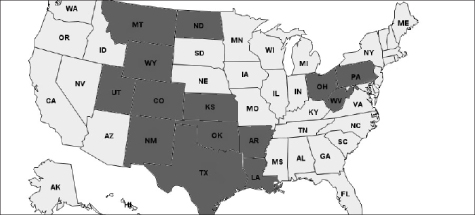Wolf’s frack attack: Governor Tom Wolf disagrees with fracking ban in N.Y.

Fracking is a nationwide debate throughout our country and is faced with many critics who don’t support the procedure. However, Governor Tom Wolf of Pennsylvania isn’t one of them.
Hydraulic fracturing, or fracking, is a way of obtaining natural gas that is hidden deep under the surface of the ground. Rocks, such as shale, can hold the gas in their pores nearly 7,000 feet underground. Hydraulic fracturing simply forces the gas out of the pores through a process derived from scientific engineering.
This happens by shooting a mix of water, sand and a small amount of chemicals at a horizontal level underground, causing cracks and fissures to spread throughout the rocks. The water mixture is pushed into the crevices, which forces the gas out. The natural gas is then collected and stored in tanks for later use.
Though it’s completely up to the states opinion, there are many reasons why fracking is not banned everywhere in the U.S. yet.
Fracking allows for drilling in one place on the surface, but it runs very far horizontally underground. This allows more material to be collected, but only a small amount of working space. Drilling for oil, on the other hand, needs to use much more surface space to obtain the oil needed.
In addition, the burning of natural gas is much cleaner than that of oil or coal. It releases much less amounts ofcarbon dioxide, nitrogen oxide and other gases. This means fracking would be more environmental friendly towards the atmosphere.
Fracking also drastically lowers the U.S.’s demand on foreign oil and opens up many economic opportunities.
According to Halliburton.com, over the past 60 years, America has gained over 600 cubic feet of natural gas.
However, there are many critics who don’t agree with the procedure of fracking.
One of the most common complaints is about the chemicals added to the water that is forced into the rocks. The chemicals take up a small amount of the water and sand mixture, but when pumping millions of gallons of water, this percentage becomes a large amount. These chemicals are used to dissolve minerals that may block the pressure.
The concern comes about due to the fact that these chemicals stay in the ground and soak into soil and groundwater.
Another concern is how cracks and crevices formed can continue to travel and may lead to a potential water source.
This means natural gas and oil can move into water supplies. Even though this hasn’t yet been documented, this is still a potential threat.
Currently, Texas, Pennsylvania, Colorado and North Dakota are the leading states in fracking. These four states have between 5,000 and 100,000 fracking wells, while all other states have below 5,000. Pennsylvania has many more people who are against government regulations on fracking than other states who are for it. Recently, Governor Andrew Cuomo of New York banned fracking in his state; however, Wolf disagrees.
“[Governor] Wolf opposes a ban, and he will work hard to make sure the process is safe,” Jeffrey Sheridan, a press secretary for Wolf, said. Wolf doesn’t plan to ban fracking in Pennsylvania. However, he will have more strict measures of ensuring the process is safe.
In 2012, Pennsylvania’s state legislature passed Act 13, which says that all fracking companies must submit a detailed form to the Pennsylvania Department of Environmental Protection within 60 days of completing a frack. This law will ensure that fracking companies cannot keep the public “out of the loop.”
Even though Wolf won’t ban fracking in Pennsylvania altogether, he does plan to ban fracking in public lands and forests. Fracking is only allowed in lands bought by the fracking companies.
This directly affects many Pennsylvania residents. Because of the economic value of the process, many families gain a lot of money from allowing fracking to be done on their property. However, if fracking wasn’t limited, it would invade the public parks and forests. Also, Freedom Area School District, having large areas of land, is high in the fracking industry


